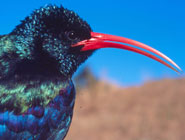Just as football fans commiserate with their friends in the pub when their team loses a match, research from the University of Bristol demonstrates that birds support one another following contests with their rivals.
Dr Andy Radford, reporting in Proceedings of the Royal Society, Series B, shows how green woodhoopoes, a South African bird, increase their preening of other group members following conflict with neighbouring groups, especially when they lose a battle or it lasts a long time – the most stressful situations. In particular, dominant birds increase their preening of subordinates, perhaps encouraging them to stand and fight in future conflicts.
Green woodhoopoes live in groups of up to twelve individuals, which include a dominant breeding pair and a number of non-breeding, subordinate ‘helpers’ that assist in the raising of the dominants’ offspring.
Rival groups often engage in raucous vocal displays, akin to opposing football supporters chanting at one another. During these conflicts, subordinates contribute more than dominants. Because groups with the greatest number of participants tend to win, dominants might be providing subordinates with preening in return for the latter’s participation.
Theoreticians have long suggested that the amount of conflict in which a group is involved could influence the level of cooperation or affiliation displayed by its members. But despite the prevalence of inter-group rivalry in many social animal species, almost no empirical studies have investigated this potential link.
Radford has shown that preening rates are highest in groups of green woodhoopoes (Phoeniculus purpureus) that have the highest number of conflicts with their neighbours. Radford explained: “Preening may reduce stress and enhance cohesion among group members, which is particularly important following battles that are lost.”
These results emphasise that our understanding of co-operation and group dynamics can be enhanced by investigations of how inter-group interactions affect intra-group processes.
